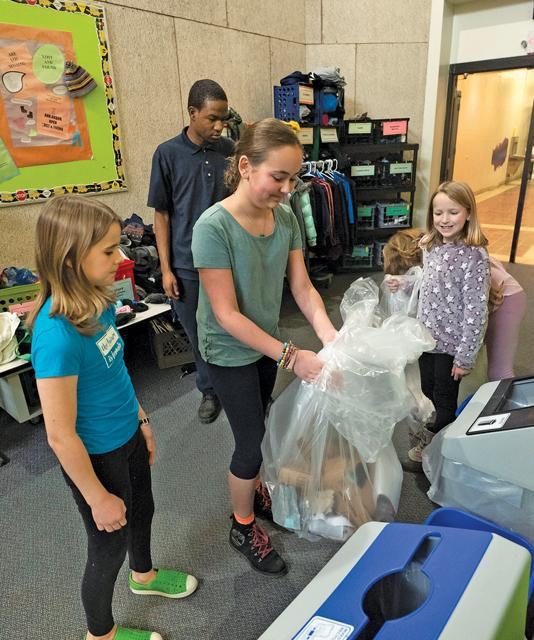According to assistant principal Christopher Curtis, that’s now down to one.
Kids now separate their compostable and recyclable materials instead of throwing away everything. They stack their trays. They even sort and ship out their juice pouches for recycling.
Reducing waste at Open took a community effort. Parents like Lisa Quijero helped rollout. Custodians like Jalyn Boone appreciated no longer needing to empty the trash three times per lunch. The lunch supervisors were very supportive. Even the kindergartners helped by making signs for the sorting stations.
Curtis says he and Quijero knew the kids would support the idea, but they were surprised at just how well. “They were way better at it than I thought they would be.”
Lawton Elementary has also seen impressive results. On a typical Wednesday in November, the school composted fifty-four pounds of food and thirty-one pizza boxes.
For Lawton parent Kimberly Edwards, it’s not just about diverting more than 250 pounds of food a week from the landfill. “Food waste, when put into a landfill, breaks down to make methane gas, a significant contributor to climate change,” she explains. “By composting food waste, we take a material that would contribute to climate change and make it back into healthy soil to grow food. For our children’s sake, I want to do what I can to slow climate change.” And students are so eager to help, she says, that “I am constantly turning away students who want to be a part of the compost team.”
Edwards didn’t stop at lunch. “I have converted all our major school events to be zero waste events,” she says. “With the help of Recycle Ann Arbor, we have achieved 90 percent composting/recycling for the Run-a-thon and ice cream social and 100 percent for the field day.”
The city doesn’t collect compost over the winter, so Lawton stops food composting then. At Open the recyclers have borrowed compost carts from families and are storing the compost in an enclosed area till spring.
“This year it’s just a matter of surviving” the winter storage, says Curtis. He is hopeful that next year the city will switch to year-round compost collection as proposed in its solid waste plan.
Interviewed before his departure at the end of February, former city administrator Howard Lazarus said that’s still an open question. “The extension of composting to a year-round service is dependent upon the city realizing the savings from changes to the current residential recycling collection contract,” he explained. “A new approach is not in place, so we will not be extending the service this year.” The city is seeking bids for a residential collection contract, so it could potentially be in place in time for the 2020-2021 school year.”
No matter what happens with the city, Open continues to go green. According to Curtis, the school is using fewer non-recyclable bags to collect recyclables and plans to eliminate the ones that remain. They are building on-site compost for food waste from the classrooms. Curtis emails that they also are looking at what to do with the foam lunch trays that fill that one trash bag.
“Another classroom is discussing fundraising the [$]12k needed to purchase a machine that will reprocess the styrofoam lunch trays into plastic bricks that can be used in a variety of ways.”


